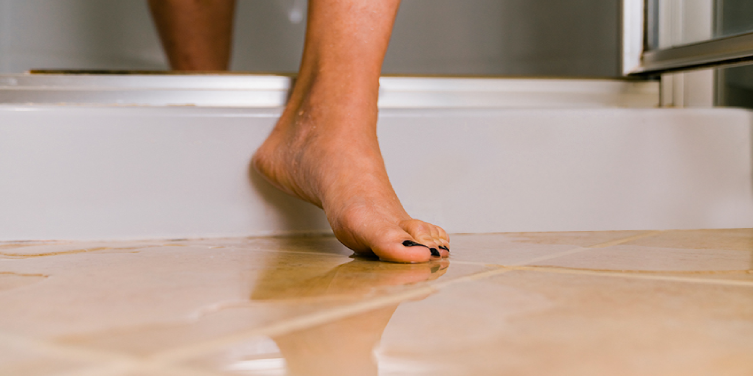
Does water leak downstairs when someone showers upstairs? Do you notice wet spots or water stains on the ceiling directly below the bathroom? You may have a ceiling leak from the upstairs bathroom. This type of leak is very common.
How much damage can a small shower leak cause? Plenty. Water will ruin the drywall and could lead to wood rot and costly structural damage. Mold may grow and put your family at risk of respiratory illnesses or skin irritation. To make matters even worse, you may see a spike in your water bill. If you want to keep your home safe, you need to repair the problem right away. Here's how to find a leak in the ceiling from an upstairs shower:
How to Determine the Source of the Leak
Before you start making plumbing repairs, you need to find the source of the leak. But water leaks in the ceiling are not always easy to diagnose.
Here are five possible causes:
- Leaking Water Pipe
Broken or loose pipes are a leading cause of shower leaks. If access is possible, take a look at the water valve behind the walls. Are the connecting pipes damaged? Do you see dripping water? If so, you can assume this is the source of your leak. - Damaged Bathroom Tile
Bathroom tile is decorative, but it also serves to keep shower water from seeping into the surrounding walls and your bathroom floor. If the tiling becomes loose or damaged, water can leak into the room below. Old substrate (the surface the tile adheres to) and worn-out grout may also be to blame. - Faulty Shower Faucet
Does your shower faucet drip after turning it off? A dripping shower faucet can waste hundreds of gallons of water each week, and it can also cause leaks inside the wall. Damaged O-rings, washers, or gaskets are usually to blame. - Clogged Drain
When hair, soap, and other debris clog a shower drain, the water can’t go down the drain. If the tub or pan overflows, it could leak through the ceiling below. - Leaking Drain Gasket
Over time, the rubber gasket under the shower drain can dry out, crack, and leak.
It may take some trial and error to determine the exact source of the leak. You may even find other signs of water damage along the way. Upgrading your shower fixtures may be in order.
How Plumbers Fix a Leaky Shower
Here’s what a plumber might do to repair various causes of a leaking shower:
- Before starting any repairs, turn off the water supply at the main shut-off valve.
- If the leak is near the faucet or in the walls, tightening the supply line connector joints may work. The connectors don't need to be super tight—hand-tight is right. Over-tightening can warp rubber fittings and make the leak worse.
- If the substrate behind the shower tile is water-damaged, you’ll also need to install new substrate and tile.
- Look for any holes in the grout—even a tiny hole can be the source of a leak. Fixing leaking grout means replacing it. Your contractor will scrape out the old grout and apply a new layer.
- A plumber will run a plumber's snake through the shower drain to remove any blockages.
- A plumber may also re-seal the shower drain. This involves removing the old gasket and cleaning away any residue or old sealant. Next, a new gasket goes in, a silicone sealant is applied to waterproof the area, and then the drain is put back in place.
Choose the Local Plumbing Pros to Stop That Leak
Still can't figure out why you have water leaking through the ceiling after showers? Some ceiling leaks are more complicated than others, but for your local Mr. Rooter® Plumbing, it's just another day on the job. Our plumbers will work fast to diagnose and repair your leaking shower. Connect with us online or call us if you want to stop that shower leak for good.

